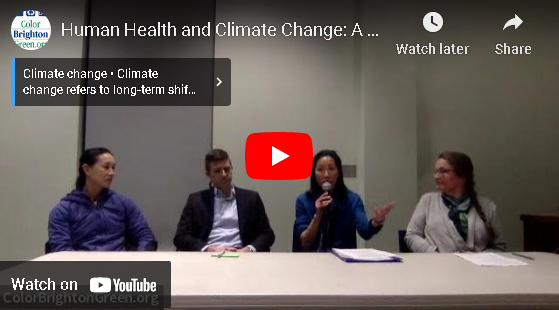Climate change, together with other natural and human-made health stressors, influences human health and disease in numerous ways. Some existing health threats will intensify and new health threats will emerge. Join Color Brighton Green for a panel discussion facilitated by Dr. Allen Blair, internist, including Dr. Daniel Croft, pulmonologist, Dr. Sandra Jee, pediatrician, Dr. Janet Lewis, psychiatrist, Dr. Valerie Lou, emergency medicine physician, and Dr. Jane van Dis, obstetrician/gynecologist.
Monday January 23, 2023 at 6:30 pm Brighton Memorial Library Friends Learning Center
Diseases Spread by Mosquitoes, Ticks, and Fleas
Climate change can increase the population and geographic distribution of insects that carry diseases. Warmer temperatures expand the range of mosquitos, ticks, and fleas, giving them the opportunity to spread their pathogens more widely. This increases the chance of people becoming infected with illnesses like Lyme disease and malaria. Furthermore, higher temperatures accelerate their life cycles, resulting in greater numbers of bugs carrying diseases within a shorter amount of time.
Heat Stress and Illnesses Due to Extreme Temperatures
Extreme temperatures can also cause extreme heat and cold stress, which is a leading killer during heat waves. Furthermore, higher temperatures due to climate change increase levels of ground-level ozone pollution, which can make it difficult to breathe and may lead to increased hospitalizations due to conditions like heart disease or asthma. Additionally, milder winters can bring more airborne allergens, leading to increases in healthcare demand for allergies and asthma.
Air Pollution and Increased Risk of Respiratory Disease
Scientists have found a link between air pollution and an increased risk of developing respiratory diseases, such as asthma and COPD. Air pollution has become increasingly worse due to the burning of fossil fuels, and climate change can make air quality even worse in many areas around the world. Exposure to air pollutants can damage lung tissue and lead to shortness of breath and other symptoms.
Food Insecurity Exacerbated by Climate Change
Climate change is also impacting food production, with agricultural output dropping in some regions as a result of extreme weather. This can lead to food shortages and increased hunger, particularly in poorer areas where access to other sources of nutrition is limited. Extreme weather events, such as droughts and floods, can also disrupt the availability of staple foods and increase food prices, leading to an overall decrease in the quality and quantity of food for many people.
Changes in Mental Health Caused By Climate Change
Climate change can also have an impact on mental health, with such impacts as fear, anxiety and depression all increasing. This is caused by the direct impacts of extreme weather events or the indirect effects of displacement and other psychosocial factors associated with climate change. These stressors can lead to feelings of powerlessness, helplessness, and hopelessness in individuals who were affected.

